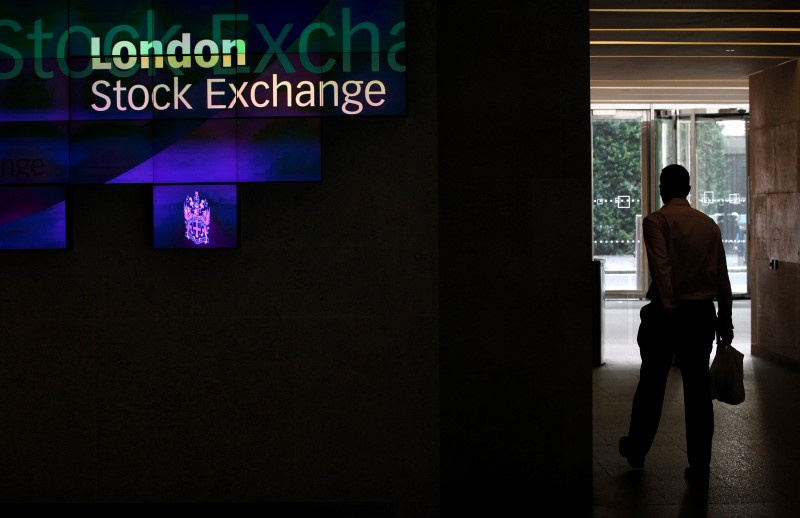By Claire Milhench
LONDON (Reuters) - Global investors raised their cash levels to 16-month highs in October at the expense of bonds, reflecting a turbulent month in debt markets beset by fears the multi-decade bond bull run was coming to an end, a Reuters monthly poll showed on Friday.
A sell-off in UK gilts, U.S. and European government bonds in October encouraged global funds to pare back their bond holdings to 39.9 percent of their balanced portfolios, the lowest level since June, and raise cash to 6.6 percent, the highest since June 2015.
With the U.S. Federal Reserve expected to raise rates in December, some cash deposit rates now look attractive relative to bonds, with three-month Libor <USD3MFSR=> rising since late June to seven-year highs.
The poll of 58 fund managers and chief investment officers in the United States, Europe, Britain and Japan was carried out between October 14 and 26.
During this period investors became increasingly focused on when central banks would step back from their ultra-accommodative stance, pushing bond yields higher and bringing bond bears out of hibernation.
The concerns have grown since September when the Bank of Japan changed its focus from money printing to targeting government bond yields, and were exacerbated by rumours that the European Central Bank (ECB) might reduce the scale of its asset-purchase programme.
ECB President Mario Draghi shot down any talk of tapering at the bank's Oct. 20 meeting, so the majority of survey respondents who answered a specific question on the ECB did not expect it to end its massive bond-buying programme in March. But some investors expressed growing qualms.
Mark Robinson, chief investment officer of Bordier & Cie (UK), identified a number of risks, such as the waning efficacy of central bank policy, uncertainty around Brexit and anaemic global growth.
"Complacency surrounding these issues appears to be quite high," he said, suggesting the need to proceed with caution.
"Central bank policy may, of course, continue to drive asset prices higher and bond yields lower, and a more cautionary stance may prove unnecessary ... but the longer this period of central bank intervention goes on, the greater some of the market risks are likely to become."
Peter Lowman, chief investment officer at UK-based wealth manager Investment Quorum, added that whilst central bank buying would act as a cushion against any rout in the bond markets over coming months, bonds still remained unattractive from a valuation and yield perspective.
STERLING BATTERED
UK gilts and sterling have had a particularly turbulent month, with the pound revisiting its 'flash crash' lows of Oct.7 later in October after Prime Minister Theresa May raised the spectre of a "hard" Brexit.
A hard Brexit is one in which Britain leaves the European Union's single market in order to impose controls on immigration, disrupting access to its main trading partner.
The pound has shed nearly 18 percent against the dollar since Britain's June vote to leave the EU, but the majority of poll participants who answered a specific question on sterling did not see it reaching parity by the end of 2017, with several saying a "hard" Brexit was not their central scenario.
However, Frank Haertel, head of asset allocation at Bank J Safra Sarasin, said the current account deficit and high debt levels posed some risk for the pound longer term. This could trigger a further decline of sterling in 2017, especially if the Brexit negotiations between the EU and Britain got tough.
Trevor Greetham, head of multi-asset at Royal London Asset Management (RLAM), also saw further downside risk, but added that economic data had been surprising positively, which could limit the amount of downside.
LITTLE RELIEF
Investors raised their equity allocation slightly to 44.2 percent, the highest level since June, with some pointing to improvements in China and Europe. However, the general mood was one of caution, with the upcoming U.S. presidential elections looming on Nov. 8.
Survey respondents who answered a specific question on the elections were evenly split over whether a victory for Democratic candidate Hillary Clinton would trigger a relief rally. Several said much of the move was already priced in.
Whilst most investors who expressed a view thought a win for Republican Donald Trump would trigger a fall in global markets, a Clinton administration would be seen as the status quo.
"Some sectors will probably benefit from Clinton's victory – healthcare, alternative energy, infrastructure," said Matteo Germano, global head of multi-asset investments at Pioneer Investments, adding that higher taxes, more regulation and increased social spending could be a drag on economic growth.
Investors continued to favour emerging market assets, raising their exposure to Asia ex-Japan equities to 7.1 percent from September's 6.9 percent.
"The outlook for Chinese growth remains solid with money supply growth strong," said RLAM's Greetham. "This suggests upside to emerging market equities."
Boris Willems, a strategist at UBS Asset Management, added that market concerns about China had remained subdued of late as stimulus measures such as fiscal loosening and interest rate cuts had helped drive an improvement in the data.
Emerging market debt holdings increased to 10.9 percent of global bond portfolios, up from 10.5 percent in September. Asia ex-Japan bond exposure rose almost two percentage points to 4.5 percent, a near one-year high.
